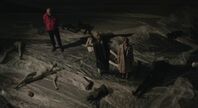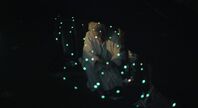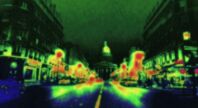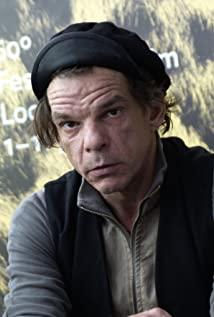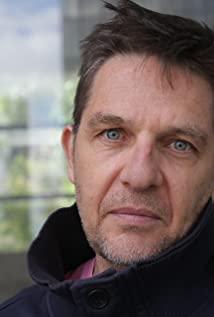This year’s Oscar won this year’s Oscar by the slightest bit of a miss, and the judges may not understand it very well. Such an enlightening schizophrenic film cannot be appreciated and understood in one go, but the first time it is seen Really enjoyable. First of all, the absurdity of the film and the postmodernity of the language go straight to the deepest pain and helplessness in the soul. The instant transition between symbols and line drawings will keep the nerve cells always active and moderate, and can make people have many associations, many I think there are still many connections between the shots, but the artistic logic of this film is far from being seen in one go. This film can be interpreted from two directions. One is the role played by the protagonist working on the Lincoln car to complete 9 tasks, which symbolizes the contradiction that the naturalness of the emotions of life, old age, sickness and death and the social dress cannot be integrated into each other. Sex, another is probably from the objectivity of time and space that do not allow a short life to have everything and inevitably leave regrets, confusion, and even despair to death to analyze these ultimate philosophical issues of life. The 2nd time can meticulously interpret every detail. This is more complicated and requires a little bit of analysis to figure out the association. At the beginning of the story, the director lived in a wall with a picture of a forest. After the director woke up, he opened the wall and walked out, seeing the children and dogs in the cinema. And this dog is the same dog that was on the bed when he completed the 8th mission. The director of this section probably wanted to explain that his film was probably the inspiration of a dream. Then a little girl is in the window, and the glass reflects the tree. This picture is beautiful, probably symbolizing the isolation of human beings from nature, and the villa behind is designed like a ship. People standing on the roofs of their houses to breathe shows that people are still very eager to communicate naturally, but they are blocked by houses and can only communicate with each other by standing on the roofs. This method seems to have reached the extreme. And in the end, the fear among those Lincolns of being abandoned echoes the irony of the word HOLY itself, a modern belief in machinery that is seen as sacred, but the machinery itself seems to worry about being abandoned by humans. worry. At least the person standing on the roof of the ship should have thought of this kind of thing! The protagonist completed a total of 9 tasks. The identity of the protagonist's company is unknown. The boss should be the female driver for him, because in the end the female driver gave him money, and as soon as he got in the car, he seemed to have the identity of a CEO to avoid finances. I decided to play a beggar begging for food. After getting out of the car, I followed 2 bodyguards in an attempt to get some sympathetic rewards, but no one gave him money. This task fully shows that his behavior of begging and bringing bodyguards is too acting, and it also proves that he is smart and cunning when he says the crowd in the car. This task probably symbolizes the extreme of identity and behavior: as a powerful person, he still has to beg for money from the world, but he is afraid of being hurt by the world and brings personal bodyguards. The second mission is very abstract but very beautiful. The protagonist wears a starry night suit and performs martial arts with a stick and a sickle in a dark theater. Then he charges on the treadmill with a submachine gun and shoots at the wall on the screen. This I think the mission is probably a symbol of people fighting themselves in the dark, and the big screen symbolizes that people always have various hallucinations, and when the protagonist falls and continues, there is a beautiful woman, which symbolizes desire, this The passage of the mission is probably to explain the meaning: people are always lost in the jungle of desires in the hesitation, and people's own enemies are actually themselves. Think about it, even after success, people will be addicted to desire, and always use desire to motivate themselves to succeed, but desire itself seems so weak and ineffective, so the relationship between the two is mutually reinforcing. The two deformed demon boys and girls in the last animation did not have sex, but the man's genitals just kept rubbing outside the female vagina. In the third mission, the protagonist plays the madman Med—a bloodthirsty and murderous maniac. First, let the protagonist go down a well, and then there is a crow’s cry, and then a group of people appear in the well walking back It probably means that the road the protagonist walks is not an ordinary person, but a retrograde one. This may mean that many people are unable to complete this task and retreat back, and the protagonist came out of another well to a grave, and then appeared again. The sound of the crow, pay attention to the crow is a smart bird that can distinguish between human beings and has an excellent memory. It calls the instructions to remind others to pay attention to this murderous lunatic. The grave is engraved with the English "VISIT MY The fourth task seems to be relatively simple. The protagonist pretends to be a father to pick up his daughter who is attending a dance. The daughter lied to her father in the car and said that she was popular, but her father found out because of a phone call. The reason was "happy at least at that moment", and the punishment given by her father turned out to be to let her "be herself". I have never been a father nor a daughter in my life, so this feeling is difficult to understand, but generally it can be seen that a father always spoils his daughter, and the daughter is a woman after all. Fuzzy love is so confused that she even prepares golden flowers to throw on her head at the ball to lie to her father how happily she dances too. But the father insisted on asking his daughter to admit why he lied and the daughter answered him truthfully. I think the father is still very happy. The daughter feels that the father is very tired, and the father seems to be more aware that the daughter is too tired to live, so he punishes her for doing her own thing. . After that, my father did seem to be himself, and went to play the accordion with a bunch of people. This must be a relaxation rather than a task. This task seems simple, but in fact it is deeply ironic to the family in modern society. I have basically said it very clearly. Even family members are deceived and cannot be themselves at home, so what is the difference between this family and the outside world? And if lying is fun, is truth so unhappy? I think if people do this, it is true that the pleasures of the world have become deception, and truth has become the punishment for self-salvation. And this story is my favorite. The 5th and 6th missions look ridiculous, the protagonist goes to the basement and speaks Chinese to find another person who offended him, kill him, and make this person look like himself, but the dead man The man slashed him again, and then he returned to the car and was asked a question about his artistic experience by a person who looked like a boss. He replied that he still misses the camera and likes to give the audience a sense of beauty, and then the boss said that beauty only exists in audience's eyes. Then he killed a rich man who looked like him in the street, and this time the bodyguards shot like him, but he shouted "shoot my penis". The second time I watched these 2 missions and the plot after that was ridiculous and dreamy, I was a little overwhelmed. But after thinking about it carefully, the director wants to express two meanings: saying that hatred has always been rooted in the heart, I always hope that this hatred will be cut off, even if I will pay a heavy price--being knocked out of my second child- --Life root, of course, this is the superficial meaning, and another extended meaning is that the protagonist has been deeply involved in his own acting, unable to distinguish between reality and tasks, and he has to be a hero to kill people in reality, and the two people killed One is to make him up as himself in the mission, and the other is to be himself in reality, indicating that he has already wanted to completely smash his duality, and after killing people in reality, he will be confused and think that all his pain is attributable to himself. The second child is desire. The transfer of this spiritual original sin is closely related to the hatred from murder. Killing eliminates hatred, and castrating oneself eliminates desire. It can be seen that drama is like life, life is like drama, and any concept plays in drama. External can refer to each other, can also be confused. Once some people's life is like a drama, they are very confused, confused, insane, and denying everything will follow. They have to go through a lot of pain to break down the characters they want to play and reach the superego state, but the price is painful. of. The 7th mission is to play a dying lonely old man who has decided to become a lunatic, and the niece who came to see him is probably also a lunatic because she wears 2 different shoes and shows her long hair to The old man looked at it, reminiscent of the scene when the crazy Mei De likes to eat the hair of beautiful women. From their dialogue, it can be seen that the old man once gave up this niece, and the niece married a man who only liked her money, so it was also very painful, and recalling the past always made her regretful. The understanding of death and pain between lunatics and lunatics is also quite profound. The old man did not allow her to lie to herself, and she did tell the true state of her life-marrying people because of wealth. Honesty about desire seems to be the best opening remarks in the face of death, and then the two people have a good understanding of pain, "pain is not the most profound and there are other things", the old man feels very much because he can know the answer immediately after death. Happy, and persuaded the niece to become young again, but at this time, the niece only wanted to make the old man happy when he was dying and always be by his side. This scene is still very touching. In the end, the old man explained that the root of human suffering is love and hate. If you have been cruel, then you have also been loved. To die without love, it is better to live. But the premise is the white lie he uttered under the reflection of the light. I think this kind of ultimate philosophical question can only affirm the most fundamental thing: life is pain, and life is named in the name Hope to be completely freed from death. Why do people cry when they see others dying, probably because they are envious and jealous that he will be freed soon. At the same time, it also proves that pain and happiness are complex, and human emotions are also complex. If you want to be completely liberated, you must go crazy or die. The eighth task is for the protagonist to say goodbye to the former first love who is also in this line, and then watch her and her husband die. Lovers used songs to express that once their hearts were like children, but they had to be separated, because love seemed to have become a flood, and even if they were with whomever they were with, they were forced to push themselves into the abyss. And the old man himself just switched from a person who played death to a person who watched other people die. But there is no choice but to survive, and continue to return to the car to complete the final mission. This task expresses how regrettable it is that people have to give up their children's heart and love for survival, and continue to complete their own life, but there is no way, what we need is to resist the aging of time. At the same time, we must accept the changes that time has for us. The ninth task is the easiest, that is, the protagonist goes home and spends the night with two gorillas. The music sings that maybe we all want to live once and feel the same life again. Isn't it absurd, knowing that you have to do it again? The difference is that this time I spent a good night with the gorillas. This taste should be very fresh, right? Echoes the dog entering the cinema at the beginning. The dialogue between the Lincoln cars at the end re-emphasized the relationship between man and nature: we are high-level animals, constantly destroying nature and wishing to live in peace with nature, so that our lives are full of animals. And all people's performance art in the post-industrial age is seen by these Lincoln cars, so they are worried that their sacred status will be questioned by human beings. On the one hand, we are exploring ways to improve the environment in science and technology, and on the other hand, we are still continuing the performance art that everyone faces in the post-industrial age. Probably only when this order is abolished can human beings return to nature. The collapse of a civilization seems to have to give up Technology has come, but how to look forward to the future? We can only build our own performance art in various experiences before we can understand whether it is better to live with orangutans or with people, even though the sacred Lincoln car is innocent. . . . Maybe the analysis of art films like mine will deviate from the director's intentions. I also believe that the highest realm of film is a dream, but it is indeed the first time I have tried to analyze an absurd big literary film, but I highly recommend it. This French post-new wave masterpiece, at least I can't make such a complex film right now.
View more about
Holy Motors reviews




